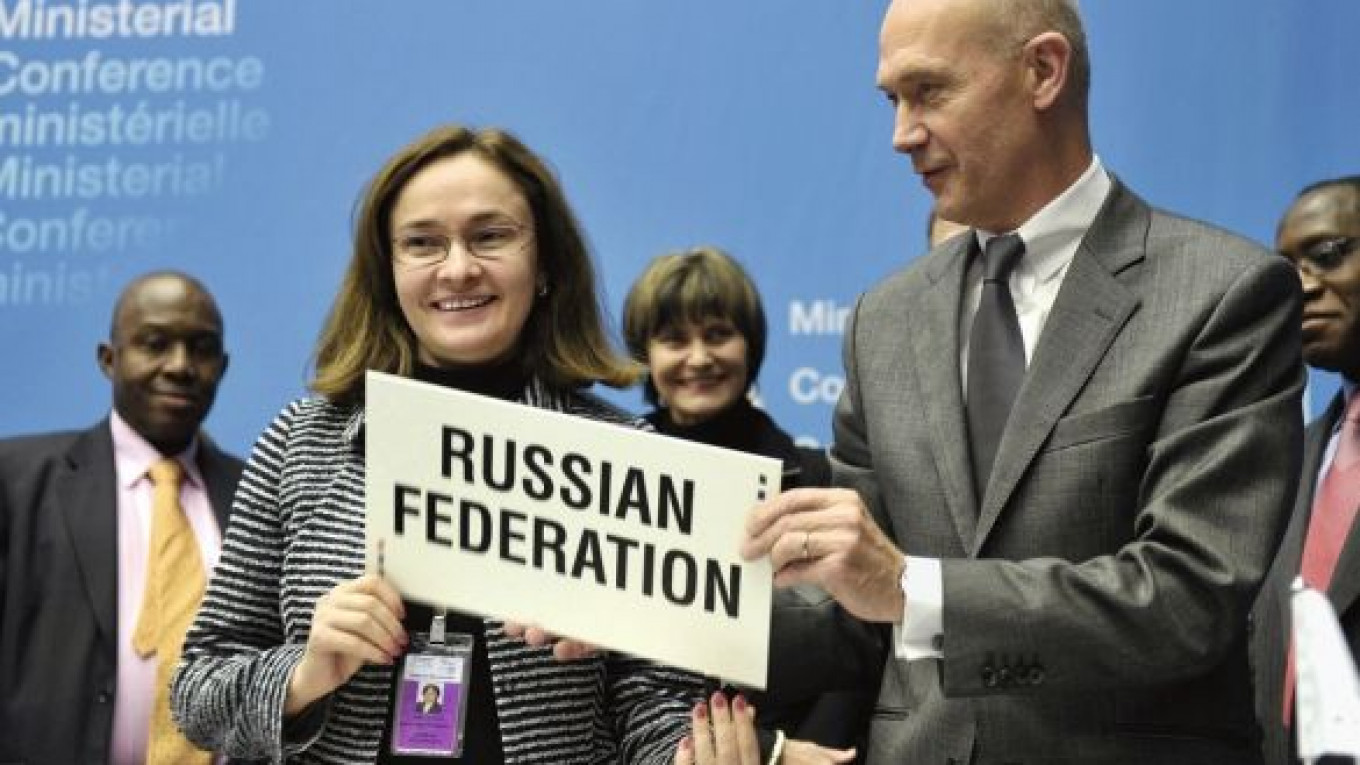Not everyone is happy that Russia will likely join the World Trade Organization this summer, and a referendum drive is under way to question the country's accession. Many Russia-based lawyers, however, welcome the nation's entry into the WTO.
The process of meeting the conditions of the WTO's multilateral agreements and the individual commitments laid out in Russia's 2,000-page accession package will generate new work for legal professionals here, said lawyers interviewed by The Moscow Times. At the same time, the effects of WTO accession on domestic law, which are already being felt, will require lawyers, judges and juries to adapt to yet another shift in the legal landscape.
"As a result of Russia's entry into the WTO, the demand for legal services in the sphere of international law, as well as the services of lawyers who specialize in solving issues in the sphere of international trade ... will increase," Oksana Kasyanova of the Moscow City Lawyers Board said by e-mail.
"WTO accession and the necessary legal adjustments ... are part of the changing environment of Russian law," said Michael Malloy, head of the intellectual property and technology practice at DLA Piper in Russia. "It does create more legal work."
Enlisted to wrestle with a large new body of regulations, lawyers will likely gain new business as more foreign companies seek to import goods and services to Russia, he added. Malloy works largely in commercial law and often consults companies that sell innovative products.
"It's certainly going to help my business because it helps the business of my clients," he said. "It's going to encourage more companies to commit to Russia."
Vladimir Tchikine, a partner at Goltsblat BLP specializing in customs and international trade, said Russia's compliance with WTO agreements will bring more clarity to this sphere. The enforceability and expansiveness of WTO regulations will allow him to conduct his practice more effectively, he said.
Currently, Tchikine works mostly with Russian legislation and the legislation of the customs union between Belarus, Kazakhstan and Russia. Although Russian customs regulations are clearly written, he said the lack of judicial interpretation makes them hard to enforce. WTO regulations, on the other hand, do have existing interpretations, which will allow him to better serve his clients, he said.
"I can more effectively defend the interests of importers during disputes over regulations," he said. "I will have new arguments that are currently not fixed in Russian law."
The resolution of trade disputes within the WTO framework is a key part of membership that will afford Russia-based customs and corporate lawyers a new avenue of practice. According to the procedures agreed upon by WTO members, countries may try to resolve disputes through consultations and, if that fails, have a WTO panel hear the case. Both stages of the procedure require the services of technical and legal experts, said Alexander Bychkov, a partner at Baker & McKenzie CIS specializing in tax and customs law.
Meeting the conditions of WTO multilateral agreements and individual commitments will generate new work for lawyers.
Already, foreign companies have sought expert advice from Baker & McKenzie on raising trade disputes with Russian customs regulations, he said. As soon as Russia joins the WTO, investigations will be opened into possible violations of the WTO's free-trade mandate.
"I know from my practice that there are other countries waiting for Russia's formal accession to raise such disputes," Bychkov said.
WTO disputes "will be a new, interesting angle of our legal profession that will require an adequate number of specialists," he added.
Dispute resolution could become a significant source of legal work for trade and customs lawyers. A case that goes before the WTO panel often takes about five years to be resolved, Tchikine said.
Of course, local lawyers will first have to become familiar with WTO regulations. According to Tchikine, the principles behind these rules are the same in all countries, but slight variations exist for each member. Bychkov said the inherent nuances of WTO regulations "will require certain training."
"Plus, Russian conditions are unique to Russia, and the experience from elsewhere won't necessarily apply," he said. "But that experience will definitely support" lawyers trying to interpret regulations, he added.
Malloy said the Russian legal profession will be able to master working with WTO regulations quickly given the frequent revisions to legislation here.
"Russian lawyers are accustomed to a constantly changing legal landscape anyway," Malloy said. "They're certainly capable of handling this."
"I would be more concerned about judges handling the new rules," he added.
Already, there is an "appetite among Russian lawyers" to tackle the new body of regulations, Bychkov said.
"The WTO [accession] is one of the most hotly debated topics" in the legal sphere, he said. "Baker & McKenzie is just one of the companies interested in this sphere."
A Message from The Moscow Times:
Dear readers,
We are facing unprecedented challenges. Russia's Prosecutor General's Office has designated The Moscow Times as an "undesirable" organization, criminalizing our work and putting our staff at risk of prosecution. This follows our earlier unjust labeling as a "foreign agent."
These actions are direct attempts to silence independent journalism in Russia. The authorities claim our work "discredits the decisions of the Russian leadership." We see things differently: we strive to provide accurate, unbiased reporting on Russia.
We, the journalists of The Moscow Times, refuse to be silenced. But to continue our work, we need your help.
Your support, no matter how small, makes a world of difference. If you can, please support us monthly starting from just $2. It's quick to set up, and every contribution makes a significant impact.
By supporting The Moscow Times, you're defending open, independent journalism in the face of repression. Thank you for standing with us.
Remind me later.






